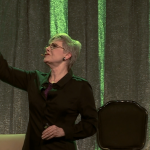
by Patricia Fripp, CSP, CPAE
Some people think that if they talk longer, they are giving more value for money. Actually, audiences are eager for content, presented as efficiently and memorably as possible.
Here’s another way to look at it. Transcribe one of your speeches, count the words, and divide your fee by the number of words. This gives you a dollar and cents value for each word.
Now delete all the unnecessary fluff and filler. For example, avoid clichés like “each and every one of you in the room.” How often have you heard speakers say that, adding eight unnecessary words? When your transcription is lean and clean, count the words again. Divide by your fee. Notice how much more valuable each word has become. Make every word count!
One of my coaching clients was a sales manager at the Fairmont Hotel in San Francisco. He was a great salesperson one-on-one, but now he was facing a group of ten. “I’m very nervous,” he confessed. “How do I sell to so many people?” A corporation was debating whether to bring their convention to the city.
“Let’s step backwards,” I said. “How long do you have for your presentation?”
“Seven minutes.”
“Who is in your audience?”
“The convention committee.”
“And what are you actually ‘selling’?”
“Well, it isn’t the Fairmont, because if they come to San Francisco, they’ll definitely use our hotel. I guess I’m selling San Francisco because they are seriously considering San Diego.”
Then I asked him a question that rarely gets asked: “How much is it worth to the Fairmont Hotel if you get their business?”
“Half a million dollars,” he said.
“Mmm,” I said, grabbing my calculator. “Let’s see. Half a million dollars divided by seven minutes—that’s $1,041.66 a second, even when you pause.”
I asked him how he would start if left to his own resources. The sales manager took a deep breath and began, “Well, ladies and gentlemen, I hope you’re enjoying our hospitality. I know…” and he was off on a stream of platitudes.
“You’re polite,” I told him when he finished, “and that’s not a bad habit, but you don’t have much time. They know who you are because you’ve been entertaining them. They know where you are. Make it about them. When you begin, why don’t you say:
‘In the next seven minutes, you are going to discover why the best decision you can make for your members and your association is to bring your convention to San Francisco and the Fairmont Hotel.’
“Now that is five ‘you’ or ‘yours’ and one ‘Fairmont.’ (Watch the ‘I’s.) Then say:
‘San Diego is a magnificent destination, and you should definitely go there in the future. However, this year you should come to San Francisco because…’ and list the specific reasons.
“This is an emotional opening because it’s ‘you’-focused. And because you never knock your competition, you’re acknowledging that San Diego is fabulous. You’ve connected emotionally with your audience, and the logical specifics connect you intellectually.
“You may argue that those polite opening comments are necessary because the audience is still settling down and not focused on you. This may be true, but don’t let it be an excuse. Go to the podium and wait until you have their attention, maintaining a strong, cheerful gaze and willing them to be silent. If needed, state the opening phrase of your comments and then pause until all eyes are focused on you, awaiting the rest of the sentence.
“Continue your presentation with logical incentives, but end with emotion. Remember that last words linger, and your goal is to be memorable.
‘Imagine years from now when your attendees are sitting around a convention lobby reminiscing about the best conventions they’ve ever attended, and they talk about their experiences in San Francisco at the Fairmont. And you’ll know you were part of that experience because you were on the planning committee.’”
Here’s a closing tip: write two closings. First your ideal and then an emergency short one. A good friend of mine, Ed Tate, the 2000 International Toastmaster’s World Champion of Public Speaking. He advises that you never know when disaster may strike, and you’ll get the signal to wrap it up immediately. Prepare a way to condense your program and jump to the grand finish. Then, when something does go wrong, you can prove you’re a real professional by doing a quick summation and providing a strong walk-away line. In Ed’s case the Red Light came on and he went to his short, emergency close and won. For Ed the rest is history. How about for you?
Patricia Fripp, CSP, CPAE,Sales Presentation Trainer,Keynote Speaker, Executive Speech Coach
